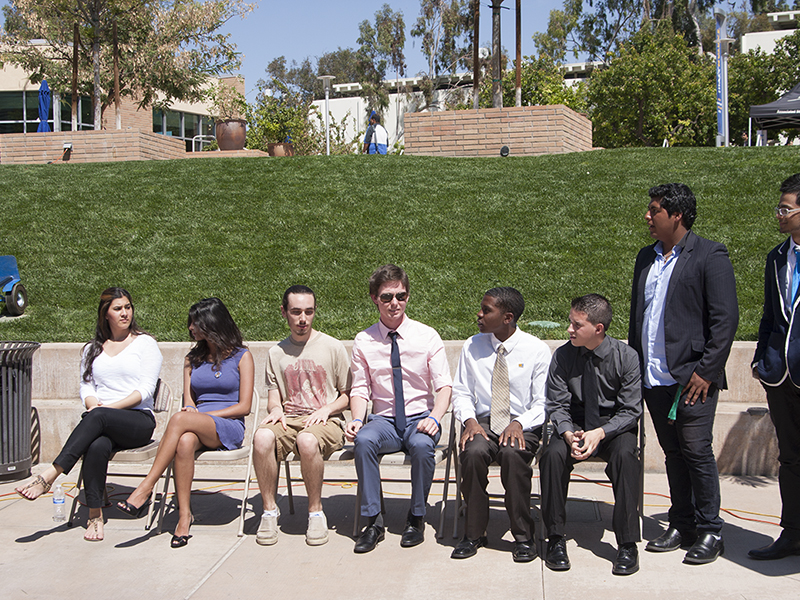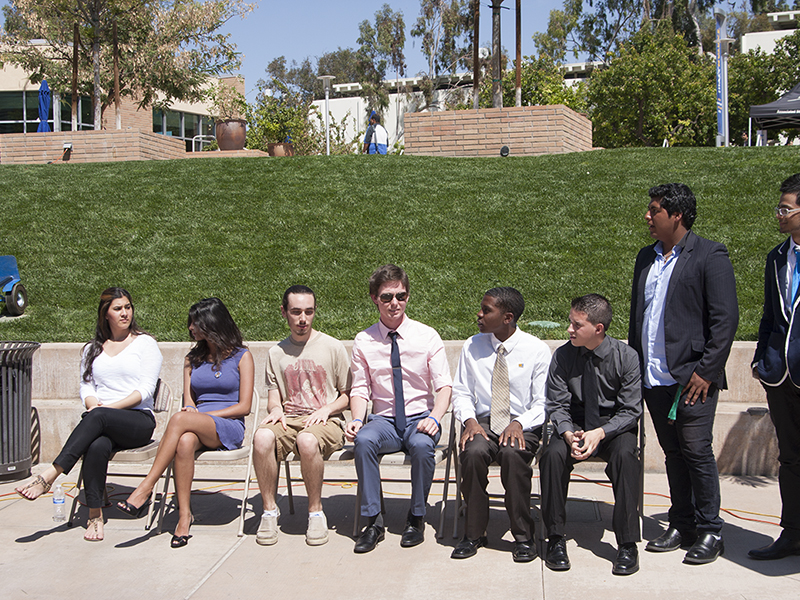
The ASUCR candidate debates were held at the HUB Lower Plaza on Thursday, April 11 at 1:30 p.m. Elections Director Harmony Chai played host, pressing questions to both the candidates for senate positions as well as those seeking the position of Outreach Director. Due to a limited time allotment not every director position could be addressed in the debates. Questions that were asked ranged from taxes to transparency within ASUCR.
Addressing the modest-sized crowd outside the HUB, representing the party [YOU]CR were incumbent senator Aaron Johnson, Abraham Galvan Sanchez, Mina Kato and Fernando Echeverria. Representing the party OUR’Side were Michael Ervin and Ravin Rathoud. Those running as independent were Kanika Jain, Christine Shi, Benjamin Roden and Tanya Singh.
The first group of students to discuss their platforms were those running for senate. The outreach director debate proceeded soon after and there are no candidates running for elections director.
Each candidate had 30 seconds to responds to each question they were asked. Candidates could also opt not to respond.
Some issues brought out more division within the candidates than others.
For example, the issue of the UCOP tax—a 1.69 percent assessment free on all UC campus expenditures—inspired candidates to propose putting pressure upon UCOP, just in different ways. The UCOP tax was implemented back in 2011, in order to ensure greater financial transparency throughout the system, yet did not previously include revenue collected from student referenda items.
“How does the UCOP assessment tax affect student services and what will you do to make sure that student services [is] not negatively affected from this assessment?” Chai asked.
Independent Benjamin Roden responded, “The UCOP tax affects students because it takes away funds that should be available for student clubs and organizations. What senators should do is very publicly admonish the administration for levying this tax on us, work with the news media, pass resolutions and really embarrass the administration…just [so] they feel they have to rescind this tax just to save face.”
Fernando Echeverria answered, “With the UCOP tax, there is one thing that is essential to do and that’s build student advocacy behind [it’s opposition]; form student coalitions and actually get people behind it to actually put pressure on the administrators—to put pressure upon the UCOP office. Something that student body [doesn’t] know is that some of the measures under the UCOP [tax] are illegal and we can be saving students’ money. No student funds are allowed to be used for renovation on campus.”
An issue such as support for undocumented students, however, garnered more similar responses. [YOU]CR party candidate Abraham Galvan, as well as OUR’Side candidate Ravin Rathod, both agreed on offering financial support for those students who do not receive the funds to attend the university.
“For me, it’s a matter of increasing the opportunities that undocumented students have because as an undocumented student you don’t have access to [federal] funds,” Galvan said. “It’s even more important for UCR to offer its own support to be there as a back-up … as a senator I would encourage perhaps more scholarships on behalf of UCR so that these students can continue to attend UCR…”
“As a community we should strive to make sure that there’s open access, that there’s existing services on campus that we can utilize for these students, these students are made more aware and that they turn into a more integral part on this campus.” Rathod said. “There should be some financial assistance done by the campus as a whole…As students we should lobby for our fellow students to get access and have the same rights as we share.”
The issue of online classes also came up. Chai asked the senators about how they felt online education should be implemented at the UC.
Independent Christine She said, “I think online education is a really good alternative but we students should go to our lecture and talk to our professors. And we need communication [between] faculty and students. So I think we can use online education as an [implementation] but not as a replacement.”
According to Chai, most of the questions asked were “directed at maintaining transparency,” which was a main theme of the debate.
OUR’Side candidate Michael Ervin answered, “As senator I will make sure that any decision that is made will welcome debate—encouragement from all student opinion by holding extensive office hours and by encouraging different student organizations that have a different opinion …”
“To increase transparency I will oppose closed-door meetings, closed ballots to make sure that whatever we do as ASUCR senators, you guys will be able to know what it is,” Roden stated.
Independent Kanika Jain answered, “Something I will do is make sure there is information out there for everyone so that they can understand the whole picture. Also, if it affects certain organizations, I would go to those organizations and ask them for their opinions.”
After the senator debates were over, Mina Kato and Tanya Singh were directed to take a seat on the row of chairs set up in order to carry out the the question and answer session for the position of outreach director.
The first thing that the candidates were asked about was their experience in outreach and planning programs for students from seventh to 12th grade.
Kato spoke about her involvement in various leadership roles such as her positions as Highlander Orientation Leader and Resident Advisor for housing. She spoke about how through these roles she was able to help establish programs for elementary students for literacy, “to get them pumped and excited to read and to come to a university for higher education.”
Singh spoke about her involvement in UECC Americorps and how she visits an elementary school everyday to work with the children there. “I see their struggles and I see how much the Eastside needs improvement … They need more preventative programs to help them fight off the problems like gang violence.”
Both candidates agreed on making the public more aware about the available outreach funds, which will allow school groups and organizations to gain financial support for projects around the community.
Kato proposed her idea for outreach not only to schools closest to UCR, but also classes in the greater Inland Empire. As she explained, it could be a part of a spirit day where children are given “UCR memorabilia—t-shirts, school supplies…that way there getting hyped up about education.
Singh emphasized the fact that Riverside has three large colleges and said she felt it was important for members of higher education to visit the schools so that, “[the students] see there are role models out there.”
After the debate for outreach director concluded, the candidates were asked to come back and take questions from the audience, which lasted only briefly.
The issue of the rather small turnout was expressed by several of the candidates when asked about what they thought of the event and its impact.
Current senator Aaron Johnson stated the debate turned out well, yet felt that improvements could be made for future debates.
“Obviously being at the Bell Tower was a lot better last year because you can catch the attention of the people walking by—you’re a little more in the center of things. The turnout could’ve been better. I think it’s all about the day because if you look at our school, nobody is out all day except for Wednesday,” said Johnson.








